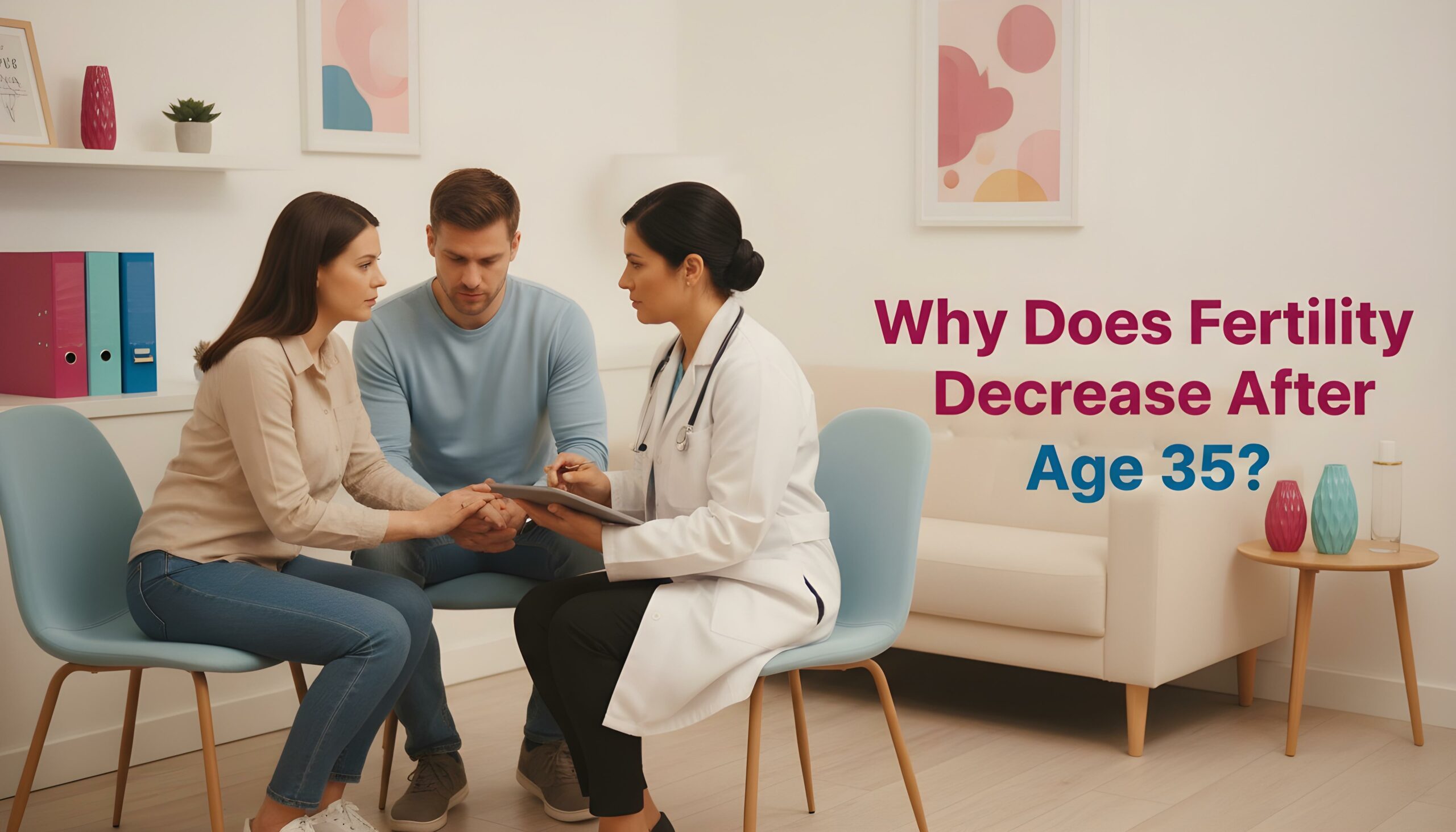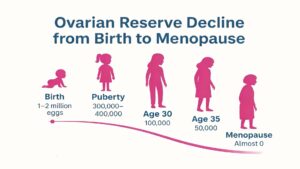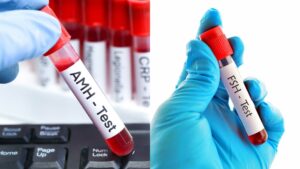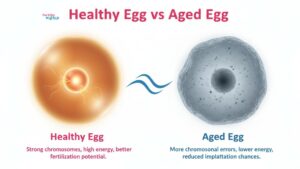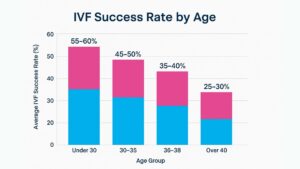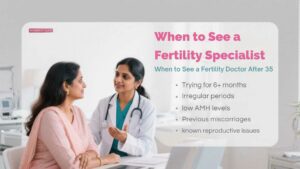Fertility naturally starts to decrease after age 35. This isn’t because you’re doing something wrong, but because the quality of your eggs and ovarian reserve slowly decrease over time. Changes in hormones, fewer good eggs, and a higher chance of chromosomal problems all make it a little harder to get pregnant after age 35. But there is always hope. Many women can get pregnant with the right help, even in their late 30s and early 40s.
Not sure how to get pregnant after age 35? We’re here to help you.
Get a free consultation via contact +91 9311850412 or email info@fertilityworld.in.
The Truth About Fertility and Age: What Happens After 35
If you are trying to get pregnant and are in your mid-30s, you know how bad it feels when another month goes by and a test comes back negative. “Why is this so hard?” “Why did no one tell me?” You may have spent your 20s getting a job or looking for the right person. You chose things that felt right, and they were. And now Fertility Decrease After Age 35 But now it feels like your body is against you, which isn’t fair.
It’s what’s going on, and it’s not your fault. Your eggs have been getting older with you since birth, so Fertility after 35 changes. Women’s Fertility begins to drop, and it’s noticeable after 35. As there are fewer and lower-quality eggs as you get older, your Fertility will decrease. No, you are not too late. Every day, Pregnancy after 35 happens. You can try to get pregnant naturally with help, with IVF, egg freezing, or donor eggs. You still have time. Let’s talk about what you can do and what is really going on. You should have hope, not just worry.
The Science Behind Female Fertility
Let us talk about what’s going on inside your body. Once you know about the female reproductive system, you can see why doctors tell you that fertility drops with age—it’s just the way things work.
How Ovarian Reserve Works
Your egg production is what ovarian reserve means. Most women don’t know this, but you were born with ALL the eggs you’ll ever have. You don’t make new ones like men do with their sperm.
You had between one and two million eggs when you were born. By teens? There are now only 300,000 to 400,000 left. And only 400 to 500 of them will actually ovulate in their whole lives. The rest slowly go away, whether you’re trying to get pregnant or not.
“I’m losing eggs every month?”
Yes. Every cycle naturally reduces your reserve. Even on birth control. Even when not trying. The link between your egg reserve and age is always there; you can’t stop it. That’s how eggs are made and how your body works.
What Happens to Fertility After 35
At 35, two major things change with a woman’s fertility age:
- Egg loss speeds up — Before 35, you lose eggs gradually. After? It goes faster. It’s harder to find eggs.
- Egg quality drops — This is the bigger issue. The eggs you have are more likely to have chromosomal problems. Older eggs have been in your ovaries longer and are more prone to genetic problems.
“What does ‘egg quality‘ mean?” Whether the egg can:
- Fertilise successfully
- Develop into a healthy embryo
- Implant properly
- Result in pregnancy without miscarriage
As eggs age, chromosomes don’t divide correctly as often. More failed fertilisations. More early losses. Lower success rates. That’s why older women giving birth often need fertility help.
Age and Hormonal Changes That Affect Fertility
Besides your eggs changing as you age, your hormones also change. As a result of these changes, it’s harder to get pregnant. As you get older, learning about hormonal imbalance and pregnancy can help you understand what’s really going on in your body.
Role of AMH (Anti-Müllerian Hormone)
AMH is related to your ovarian reserve. These numbers let doctors know how many eggs your ovaries still have. These eggs are more plentiful when your AMH level is higher. It disappears as the temperature drops, leaving fewer eggs.
Here’s how AMH levels after 35 usually drop in this way:
| Age (Years) | Average AMH (ng/mL) | Fertility Outlook |
|---|---|---|
| 25 | 4.0–5.0 | Excellent reserve |
| 30 | 2.5–3.5 | Good reserve |
| 35 | 1.5–2.5 | Declining reserve |
| 40 | <1.0 | Low fertility |
Following age 35, AMH levels normally decrease, indicating fewer eggs available for recruitment. Infertility doesn’t mean you can’t get pregnant; it just means your body needs a little more medical help to get pregnant.
FSH and Estrogen Fluctuations
As you get older than 30 years old, your body and hormones start to change. What these changes affect fertility and hormone balance in simple terms:
- FSH levels are high after 35: your body makes more FSH (Follicle-Stimulating Hormone) to tell the ovaries to release mature eggs. This is a natural reaction that reduces egg quality.
- Estrogen and progesterone decline: These hormones help make the lining of the uterus thicker and keep ovulation in check. It’s harder to insert them when they drop.
- Irregular ovulation: An imbalance in hormones can make ovulation happen later or not at all, which makes it harder to figure out when you will be pregnant.
- Cycle changes: Your cycles may get shorter or longer, which is a small sign that your hormones are changing.
Egg Quality — The Core Reason Fertility Declines After 35
Let’s talk about something that many women worry about but don’t say out loud: egg quality and age. Fertility doesn’t just go down with age beyond 35; the eggs themselves also start to change. Every woman is born with all the eggs she’ll ever have, and as they get older, so do their eggs. That’s why the age when fertility declines is more about the quality of the eggs than the quantity.
It’s not your fault; it’s just how nature works. But knowing it helps you make smarter decisions, whether you’re trying to get pregnant naturally or looking at IVF.
Why Egg Quality Matters in Fertility
They decide how well ovulation, embryo growth, and implantation will go. Healthy eggs are the building blocks of life. The body’s ability to fix DNA gets worse with age, which can cause chromosomal abnormalities in eggs. These small changes to the genes can affect how the baby grows and develops in the future.
You might ask, “Does that mean I can’t get pregnant after 35?”
Absolutely not. Some older women may still be able to do it, but it may take longer or require medical help. If you have poor egg quality after 35, treatments like IVF can help give your body a second chance at becoming a mother.
Common Issues with Older Eggs
|
Problem |
Effect on Fertility |
|
Chromosome errors (aneuploidy) |
Raises miscarriage risk and lowers healthy embryo chances. |
|
Hardening of the egg shell |
Makes it harder for sperm to fertilize the egg. |
|
Mitochondrial decline |
Causes low energy in embryos, affecting development. |
|
DNA fragmentation |
Leads to weak embryos and lower implantation success. |
Because people get less fertile as they age, these problems happen more often. Don’t forget, though—even one healthy egg can grow into a healthy baby. Women in their late 30s and 40s can now use modern IVF methods to help pick the best embryos. This lowers the risks and improves the results.
Connection Between Egg Quality and Miscarriage
After age 35, the risk of loss goes up as the quality of the eggs goes down. This isn’t because your body can’t carry a baby, but because the embryo may have chromosomal problems. About 10–12% of women under 30 will have a miscarriage. By age 40, it’s closer to 30%, mostly because of these problems with eggs.
“Is it too risky to get pregnant after 35?” you might ask.
No, it’s just a trip that needs more care. These days, many women in their 40s are able to get pregnant and have healthy babies with the help of modern fertility treatments, genetic testing, and keeping their hormones in order.
Uterine and Endometrial Factors with Age
Women in their late 30s and above should know that fertility is not simply about the quality of their eggs. The uterus also plays a modest but important role. The womb might change somewhat over time, which can make it tougher for an embryo to attach and succeed. That’s why uterine health becomes such a crucial aspect of the talk about getting pregnant after 35.
Sometimes the uterus isn’t as “ready” as it used to be, even with good-quality embryos. The endometrial receptivity, or how inviting the lining is to an embryo, might slowly go down. This happens because blood flow may slow down a bit as you get older and hormones like estrogen and progesterone start to change.
Over time, this can happen:
- Fibroids or polyps may occur more frequently, hindering implantation.
- Less blood flow can make the endometrial lining thinner or less responsive.
- Problems with hormones, including an imbalance in the thyroid or insulin resistance, could change how the uterus supports early pregnancy.
Yes, for sure. Many women have full-term pregnancies after getting the correct hormonal support, better blood flow, and close medical care. Keep in mind that the uterus may stay robust and healthy with the correct care, even as other elements of fertility alter with age.
Sperm Quality and Male Age — The Other Half of the Story
Most people focus on women’s fertility, but males have their own biological clocks. Male fertility after 35 slowly changes, which is not as significant as women’s changes, but it still has long-term effects on pregnancy and the baby’s health. The quality of the sperm also slowly decreases with age, including movement, shape, and DNA. This can change the chances of both IVF and normal conception working. This can make it harder for both IVF and normal conception to work.
| Parameter | Under 35 | Above 40 |
|---|---|---|
| Sperm motility | High | Decreased |
| Morphology | Normal | More abnormalities |
| DNA fragmentation | Low | Higher DNA damage |
| Volume | Normal | Slightly reduced |
As you can see from the table, sperm quality declines with age, which makes them move less quickly, change form slightly, and have more DNA fragments. Some of these things can make fertilisation harder and lower the quality of the embryo a little, but guys can do a lot to make it better.
How Age Affects Natural Conception Chances
Getting pregnant is still possible at any age; it may just take longer. After age 35, your chances of getting pregnant slowly go down because both the number and quality of eggs you produce go down. In your 20s, your chances are great. Fecundity changes slowly and naturally, so it doesn’t happen all at once.
| Age | Chance of Conception per Month | Chance of Conception within 1 Year |
|---|---|---|
| 25–29 | 25–30% | 80–90% |
| 30–34 | 20–25% | 70–80% |
| 35–39 | 10–15% | 50–60% |
| 40+ | <5% | <40% |
"Is it harder to get pregnant when you're 35?" That is not true, but it's still possible. It just takes the body a little longer to get ready. Changes in hormones and a steady loss of egg quality after age 35 can make it take longer to get pregnant. However, with a little patience and the right care, many women can still get pregnant naturally after age 35.
When you’re 35, it may take a few months or even a year to get pregnant. That’s normal. Keeping track of your period, eating well, and dealing with stress can all help your chances. Remember that the chances of getting pregnant after 35 are less likely, but not impossible. Every good cycle is still a chance, and you can still become a mother naturally if you keep at it and get help from your doctor.
Age and IVF Success Rates — What the Numbers Show
One of the first things that people who are thinking about IVF ask is, “Do my chances depend on how old I am?” The truth is that they do, but not in the way you think. Even though egg quality typically decreases with age, modern fertility care has helped many women get pregnant after a certain age. Knowing how IVF success rate by age helps you keep your hopes up and set realistic goals for the process.
|
Age Group |
Average IVF Success Rate |
|
<30 years |
55–60% |
|
30–35 years |
45–50% |
|
36–38 years |
35–40% |
|
39–40 years |
25–30% |
|
>40 years |
10–20% |
This easy-to-understand IVF success chart shows how results get worse over time. The chances are good for women younger than 35, and they’re still good for women in their late 30s, though the chances are lower each cycle. After age 40, the chance of getting pregnant through IVF drops, but it’s still possible. With personalised care, embryo screening, and sometimes donor eggs, a lot of women in their 40s are able to get pregnant.
Why IVF Success Decreases After 35
When you turn 35, your eggs start to react to stimulation in a different way, which can change the results. This is why the rate for IVF after 35 changes:
- Less retrievable eggs per cycle means fewer embryos.
- Because of changes in chromosomes, the quality of eggs and the growth of embryos may get worse.
- Hormonal changes and getting older in the uterus can make pregnancy a little harder.
When you turn 35, your body starts to react to fertility treatments in a different way. The number of eggs produced each cycle goes down, and because of normal changes in chromosomes, some of them may not grow into healthy embryos. Changes in hormone levels can also impact how well the uterus gets ready for implantation.
Medical Conditions That Worsen with Age and Impact Fertility After age 35
Ageing affects the body in more ways than just how it looks and how much energy it has. It can also influence a person’s ability to have children. Some health problems become more common or harder as people get older, and these conditions can quietly affect how well couples get pregnant. Gaining knowledge about them doesn’t mean giving up hope; it means getting ready and taking action.
Some common health problems that make it harder to get pregnant after age 35 are listed below:
- For women with endometriosis, damage around the ovaries and fallopian tubes can make it tougher to get pregnant. Beyond age 35, endometriosis symptoms often get worse and may lower the quality of eggs.
- A fibroid is a noncancerous growth that can change the shape of the uterus and make it harder for the egg to implant. Fetal problems and uterine fibroids are linked, but surgery can make the uterus look normal again.
- Polycystic Ovary Syndrome (PCOS): This condition can happen to women of any age, but the combination of age and PCOS can cause hormonal imbalances and irregular menstruation.
- Thyroid and Insulin Resistance: Both can throw off the balance of hormones, stop eggs from releasing, and make it harder to stay pregnant successfully.
Emotional and Psychological Factors
Feelings are a big part of fertility, not just the body. Some people, especially those over 35, feel stressed, afraid, and doubtful of their own abilities when they are trying to get pregnant. This hormone can stop you from ovulating and change how your body reacts to IVF treatment if you are under a lot of stress.
Don’t feel bad about being stressed; you’re not the only one. After age 35, it can really help to keep your mental health in check by relaxing, doing light exercise, or talking to someone you trust in an honest way. A calm mind helps a calm body, and both of them make it possible for new life to start.
Fertility Preservation Options After 30 and 35
In their 30s, women’s lives often feel full as they build a job, find stability, or wait for the right partner. A quiet thought often goes through their minds, though: “What if I’m not ready yet but still want the chance to be a mother later?”
That’s where keeping your fertility after 30 years old comes in. Egg freezing (oocyte cryopreservation) and embryo freezing are two ways to protect your fertility right now and keep the door open to becoming a mother in the future.
Egg Freezing (Oocyte Cryopreservation)
You can save your younger, healthier eggs by freezing them before they start losing quality with age, which is usually before you turn 35. Your ovaries will be gently stimulated, developed eggs will be collected, and they will be frozen in a safe lab setting. Like putting away your best eggs for later; they’ll be ready when you are. How well eggs freezing works depends on how old the eggs are when they are frozen. Egg freezing can be done at any age, but the effects are best if you do it early.
Embryo Freezing
Embryo Freezing is a safe way for couples who want to have children in the future to keep fertilised embryos that were made through IVF. People who want kids but might want to wait a few more years should definitely choose this option.
These embryos can be thawed and transferred when the time feels right — giving you a head start when you’re ready to grow your family.
How to Improve Fertility After 35 Naturally
Even though getting pregnant may take longer as you get older, your body can still answer beautifully if you take good care of it. Every day changes in what you eat, how you rest, and how you treat yourself can have a big effect. Find out how to naturally become more fertile after age 35 and prepare your body for a healthy baby.
Lifestyle and Diet Changes
| Do’s | Don’ts |
|---|---|
| Eat foods rich in protein and antioxidants — they protect your eggs. | Avoid processed and sugary foods that disrupt hormones. |
| Maintain a healthy BMI — balance is key for hormones and ovulation. | Limit caffeine and alcohol; both can affect fertility. |
| Exercise regularly but gently — yoga and walking work best. | Avoid overexertion or intense workouts. |
| Sleep 7–8 hours a night to help hormone balance. | Reduce stress — emotional calm improves your chances. |
A balanced fertility diet for women should include more vegetables, whole grains, nuts, seeds, and lean meats. These are all natural foods that will help your hormones and eggs.
Supplements That Help
Some vitamins can help your body become more fertile, especially if you are over 35. It is known that CoQ10, Vitamin D, Omega-3, Zinc, and Myo-Inositol can help make eggs better and keep hormones in balance. Because everyone’s path to getting pregnant is different, talk to your doctor about any vitamin before you start taking it.
When to See a Fertility Specialist
Summary- Your Fertility Journey Doesn’t End at 35
Yes, fertility after 35 naturally declines. That’s just how our bodies work, and we can’t change biology. But here’s what you need to know: medical science has opened doors that didn’t exist before. IVF, egg freezing, ICSI, donor options — these aren’t just clinical procedures. They’re real pathways to motherhood when your body needs a little extra help.
This dream comes true every day at Fertility World IVF Centre. She planned ahead and got good care, so many women who thought they were done having children are now happy moms. Do not worry; instead, take the first step, ask questions, and learn about your choices.
If you want to know more about it, you can talk with our experts at Fertility World.
What are my chances of pregnancy after 38?
The chances of getting pregnant after 38 are a little lower—about 15–20% per cycle—but it is still possible if you are healthy and start planning early.
Is it safe to have a baby after 35?
For most women, it is safe. Small risks that come with being pregnant after age 35 can be managed with regular checkups and prenatal care.
Can IVF overcome age-related fertility decline?
Yes, IVF does help a lot of women over 35 get pregnant, especially when they use donor eggs or advanced embryo screening.
Is pregnancy after 35 high-risk?
That's an advanced maternal age, but most women can have healthy pregnancies with good care and early tracking.

